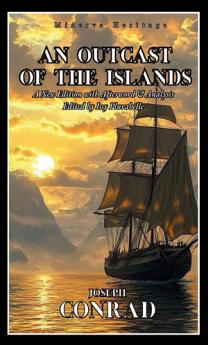An Outcast on the Island
About this ebook
This modern edition of Conrad's classic novel includes a fresh Afterword, extensive reference materials including a timeline of Conrad's life and works, character glossary and group discussion questions on this literary classic. The text of the novel has been slightly edited to remove archaic terminology and make it more readable to the modern reader.
Where Almayer’s Folly hinted at moral failure, Outcast dives fully into its waters, showing Willems as a man both driven and devoured by ego. With hypnotic prose and a growing sense of fatalism, Conrad paints a vivid portrait of a man unraveling—and the treacherous currents that drag him down. He is not merely corrupt but corrupted—by pride, by lust, by the very desperation of being cut adrift. The jungle looms not just as setting but as psychic terrain: lush, labyrinthine, and indifferent. Around Willems, native cultures observe and adapt, while European figures like Captain Lingard attempt, futilely, to enforce order on an alien world. What emerges is a deeply ironic vision of empire, where so-called civilization brings not enlightenment but chaos.
The novel unravels the myth of European exceptionalism through Willems’ disintegration. His initial fall—embezzlement and exile—is framed not as tragedy but as inevitability, the logical endpoint of a man who views himself as inherently entitled to transgress boundaries. The jungle, dense and unyielding, becomes a psychological landscape: its labyrinthine rivers and impenetrable foliage mirror Willems’ escalating delusions of control. Aïssa, though reduced to a colonial trope of the “dangerous native woman,” inadvertently exposes the fragility of his identity. Her agency, limited by Conrad’s Eurocentric lens, still disrupts Willems’ fantasies, revealing his dependence on the very cultures he claims to dominate. Lingard, the merchant captain who alternately rescues and abandons Willems, embodies the capriciousness of colonial power—a force that creates and discards outcasts to maintain its mythos. The narrative’s irony is relentless: Willems’ final act of betrayal, meant to reclaim power, only cements his irrelevance. Conrad strips away the romance of “going native,” presenting cross-cultural entanglement as a collision of mutual exploitation. Even redemption is denied; the jungle absorbs Willems’ failures without notice, leaving only the faintest ripple in its indifferent expanse.












